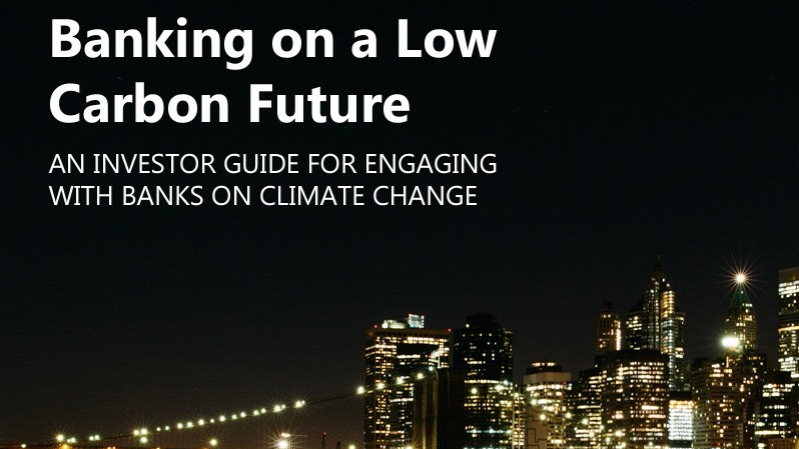Investors urged to catalyse climate-credible business models in the banking sector
Beau O’Sullivan, Press & Communications Manager at ShareAction (+44) 07950 299 491/0203 475 7859

Beau O’Sullivan, Press & Communications Manager at ShareAction (+44) 07950 299 491/0203 475 7859
Investors should engage and use their voting rights to demand that major banks play a proactive role in the low carbon transition, according to a new report published by ShareAction. “At a portfolio-wide level, the only way that investors can protect themselves against high-risk climate scenarios is through a timely and economy-wide decarbonisation. Banks are uniquely placed to help catalyse this transformation. Fiduciary investors seeking to mitigate exposure to climate risks have everything to gain from strategic engagement with the banking sector,” says Catherine Howarth, Chief Executive of ShareAction.
The report, entitled Banking on a Low Carbon Future, provides detailed guidance for investors wishing to question banks on how they are addressing the business risks and opportunities associated with climate change and the low carbon transition. The launch sets the scene for a 2017 season of collaborative activity by institutional investors to ensure the boards of banks are listening and responding to climate risk. ShareAction's agenda for banks is designed to breathe life into the recommendations of the Financial Stability Board's Task Force on Climate-related Financial Disclosures (TCFD). Banking is picked out as a sector of special strategic importance in the TCFD's interim report but historically banking has had little attention from climate-engaged investors, whose energies have been focussed almost exclusively on high carbon emitters.
ShareAction's report makes tough recommendations for banks: wind down the provision of financial services to high carbon activities and to clients who fail to transition to lower carbon business models; and stop financing coal-dependent companies altogether. The report calls on banks to scale up financing of sectors and activities that facilitate low carbon growth. Banks are also encouraged to bring their lobbying weight to bear in support of public policies that accelerate decarbonisation of the global economy.
António Simões, Chief Executive Officer of HSBC Bank, says: "It is critical that the entire financial services industry really gets behind the global consensus on climate change achieved at COP 21 in Paris. The important thing right now is that the climate agenda becomes an integral part of our day-to-day decision making process. Banks working to ensure the transition to a low carbon future is vital to achieve this aim."
In the report, Lauren Compere, Director of Shareholder Engagement at Boston Common Asset Management, says: “As climate risk becomes recognised as critical to banks, investors want to know whether this risk is being managed at the highest levels of the organisation…Addressing these challenges will require a significant break from ‘business as usual’. Please join us in using the tools and questions provided by ShareAction and others to expand investor dialogue and action with the financial sector on climate risk.” At the launch event at the Guildhall, speakers include Roger Gifford, Head of SEB UK and Chairman of the City of London’s Green Finance Initiative, Sarah Breeden, Executive Director of the Prudential Regulation Authority and Edward Bonham Carter, Vice Chairman of Jupiter Fund Management.
“Hundreds of thousands of people are demanding that the world’s biggest banks take serious action on climate change,” says Johan Frijns, Director of BankTrack. “Many of these people will have savings that have been invested in those companies. Big investors like our pension funds should take heed of ShareAction’s guidelines, and urge banks to step up their game and stop financing climate-destructive activities.”
